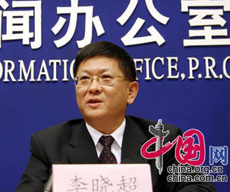Economy grows 11.5% in first 9 months
Updated: 2007-10-25 10:16
The Chinese economy continued its robust growth driven by rapid expansion in investment and credit, while inflation pressure eased slightly, official figures showed.
|
|
The gross domestic product (GDP) increased 11.5 percent in the third quarter from a year earlier, Li Xiaochao, spokesman for the National Bureau of Statistics said at a press conference in Beijing on Thursday.
That increase puts China’s aggregate growth for the first nine months at 11.5 percent, following a growth of 11.9 percent, in the previous quarter, the highest in a decade.
"The domestic economy is maintaining fast development," Li said.
The growth was driven by rapid growth in the credit and soaring investment in factories and other fixed assets.
Fixed asset investment went up 25.7 percent in the first nine months of this year, according to Li.
Consumer price index (CPI), a barometer of inflation, slowed down to 6.2 percent in September from an 11-year-high of 6.5 percent in August, putting the figure for the first nine months at 4.1 percent.
This number is far above the official target of 3 percent for 2007.
The rapid growth of the GDP, and credit and investment has increased pressure for further monetary tightening. The central bank has raised interest rates five times and bank reserve ratio eight times so far this year.
Last week, central bank governor Zhou Xiaochuan pledged to take a more aggressive approach to prevent the economy from overheating.
 A worker drives a vehicle past cargo containers at Beijing airport October 23, 2007. The Chinese economy continued its robust growth driven by rapid expansion in investment and credit, while inflation pressure eased slightly, official figures showed. [Agencies] |
Zhou pledged to use monetary tools to keep the economy on track, including interest rates and exchange rates, adjustments in bank reserve ratios, and open market operations.
Chinese analysts say that as the CPI for September has eased, it is too early to predict whether the central bank will raise interest rates again.
And on Wednesday, Premier Wen Jiabao, at a State Council executive meeting, called for continuous control on excessive fixed-assets investment, especially in industries with high energy consumption and pollutant discharges and those with excessive capacity, along with tightened supervision on credit granting by commercial banks.
"Since the beginning of this year, all regions and all departments have made tangible progress in strengthening and improving macro-control, pushing forward scientific development and promoting social harmony, yet the full-year task remains stiff," Wen told the meeting.
The meeting demanded closer monitoring of markets to ensure sustained supply and good quality of products and prevent the consumer prices from growing too quickly.
The government will make efforts to check the fast-rising housing prices and provide more affordable housing for low-income families.
|
|
|
|
|
||
|
||
|
|
|
|

